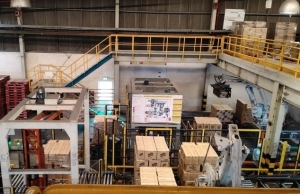INTERNATIONAL INVESTMENT
AND PORTAL
The world around us is changing fast. One hears plenty about transformation, automation, AI, and “the great resignation”. All of this is speeding up, often as a side effect of the pandemic. These changes are having such an obvious impact on business, and they simply cannot be ignored.
The result is that businesses are desperate to recruit as many people as possible in “new economy” roles. These roles look very different from the way my generation started our careers. A young person cannot copy the path of their parents as the world is simply different now. This is tricky in the Vietnamese cultural context, where traditionally youth should respect the advice of their elders. But what made those same elders successful will not work in these unusual times.
 Colin Blackwell - Chairman of HR Committee Vietnam Business Forum
Colin Blackwell - Chairman of HR Committee Vietnam Business Forum
Vietnam is becoming a global centre of expertise in a number of the newest technology areas, most notably in software. There are a surprisingly large number of world-leading technology companies in Vietnam that are expanding as fast as they possibly can. They are often providing services and skillsets where there are global shortages, so business and margins are easy for them – if only they can recruit enough new people fast enough.
In the past, a highly specialised technical role would take many years to learn. What has changed is that new technology advances are so fast that it would be impossible to spend years learning something that has only just been invented this year. It is just as well that thanks to the user-friendliness of new technology, it takes just weeks to learn the required skills. Programming is not like in the old days of writing thousands of lines of complex code. These days it is writing a few lines in plain English or even talking to the computer.
Modern programming languages can be learned in a couple of hours. I have heard it said that if anyone over the age of 12 takes more than two hours to learn Python, then there is something wrong with them. There are hundreds of free tutorials online to choose from. I tried it myself (so that the young folks cannot laugh at me) and my impression was it was not really like learning something in the old way – it is more like using a set of intuitive self-explanatory tools. It is akin to using social media for the first time, where it is designed to be so easy that anyone can do it without being formally taught.
Now if I put a certificate on my office wall saying I can use social media, people would rightfully think I was silly. The same then for learning a programming language or other modern skill online – a person can either do it or they cannot. They do not prove this with an official certificate, but by just being able to get on with the task. When my own company recruits programmers for projects, we use a simple screening test of their technical skills, followed by a larger piece of trial project work. We do not ask where someone is from or what their formal qualifications are, as that is not relevant to their ability to successfully work for us.
Everybody needs reassurance and structure in their lives. So even though plenty of free training is available online, it is a bit too much of an ask for most people to be so self-motivated to do it all without guidance and framework. Fortunately, the large software companies in Vietnam know this and have full programmes to attract young people into hot careers in cloud computing, blockchain, and AI, to name a few.
Some of the largest and best companies in the world, plus a large number of excellent local startups, are offering young Vietnamese incredibly good career options. The only selection requirements are that a candidate is relatively smart and willing to work, regardless of qualifications or experience. This is brilliant for disadvantaged candidates who would otherwise have difficulty getting a job – for example, people with disabilities.
The offers usually involve about 10 weeks of free training and a guaranteed job at the end of it. The technical skills gained are very valuable and have an ongoing global market value. I see jobs with these skillsets being advertised everywhere, paying thousands of US dollars a month. For example, a 25-year-old programmer could get a CEO equivalent salary if they can figure out deep learning AI.
I saw one company even paying young Vietnamese to take the training and offering them prizes. So getting a dream job is not just free – companies will pay to train candidates so they can later give them even more money. And all that is possible quickly, regardless of past qualifications or experience.
Now, I am a middle-aged English man in Vietnam watching all this going on around me. But if I was a young Vietnamese person, I know what I would do. That type of opportunity did not exist in England when I was that age. Increasing numbers of young Vietnamese will take these opportunities I am sure, which is not only great for them personally, but is great for Vietnam as well. Becoming a global high-tech expertise hub will be one of the contributing factors to Vietnam becoming a first-world country faster than most people would expect.
 Digital transformation to equip factory employees with future-fit skills
Digital transformation to equip factory employees with future-fit skills
Unilever’s in-factory digitalisation process not only brings efficiency, innovation, and empowerment to businesses but also helps equip the workforce – its most valuable asset – with future-fit skills.
By Colin Blackwell



















